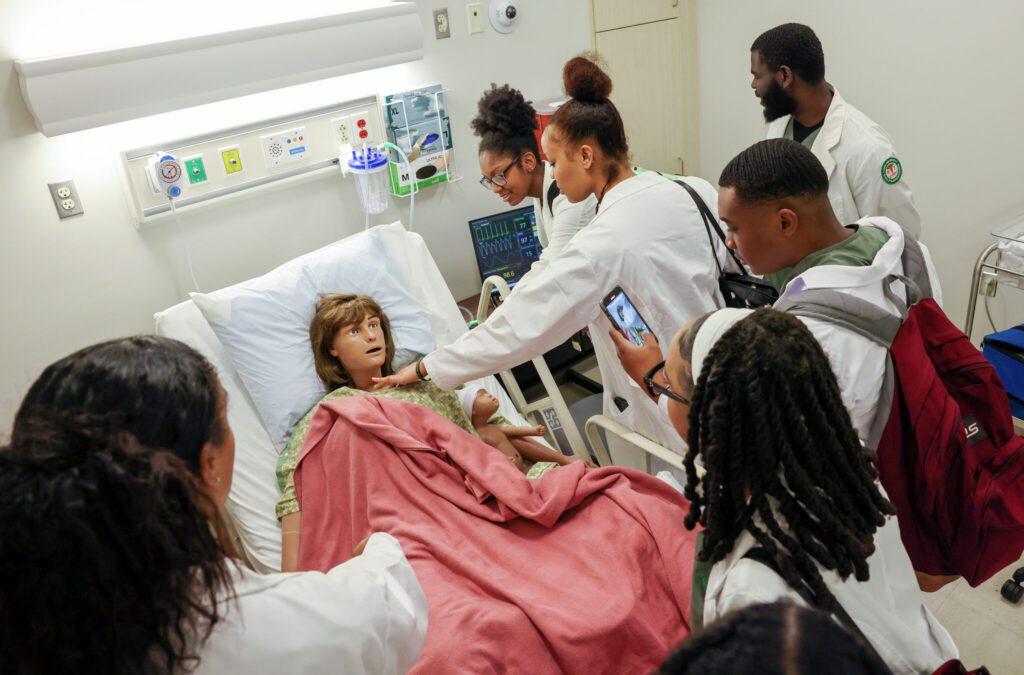
A bill signed by the Trump administration could limit funding for nursing students. (Photo by Glenn Beil/Florida A&M University via Getty Images).
Going to nursing school can be harder for incoming students after the results of the Department of Education and President Donald Trump’s “One Big Beautiful Bill.”
The Education Department will not consider nursing as a professional degree program, which can weaken funding for students wanting to enter the health care field.
Article continues below this ad
According to the Association of American Universities, Trump’s “One Big Beautiful Bill,” which was signed in July of this year, imposes a lifetime cap of $100,000 in borrowing for graduate students and $200,000 for professional students.
Under the new rules, graduate students can borrow up to $20,500 a year, and professional students can borrow up to $50,000 a year. Starting July 1, 2026, the law will also end Grad PLUS loans — the program many students have relied on to cover education costs not covered by other financial aid.
In a statement from the American Nurses Association, Jennifer Mensik Kennedy, president of the American Nurses Association, lamented the affect this bill will have on the healthcare institution.
“At a time when healthcare in our country faces a historic nurse shortage and rising demands, limiting nurses’ access to funding for graduate education threatens the very foundation of patient care,” Kennedy said.
Article continues below this ad
Nursing was not explicitly included in the federal government’s regulatory definition of a “professional degree” established in 1965. The regulation lists several fields, such as law, medicine and veterinary medicine, and notes that the definition is “not limited to” the examples provided. That phrasing has left it unclear whether nursing was ever meant to fall under the category.
The term “professional degree” helps determine student loan eligibility and repayment terms, and nursing’s omission from the original list is shaping how some borrowers are classified today.
The U.S. Department of Education is now saying nursing was never meant to be included.
“The Department has had a consistent definition of what constitutes a professional degree for decades and the consensus-based language aligns with this historical precedent,” Ellen Keast, the Education Department press secretary for higher education, told the American-Statesman in an email. “The committee, which included institutions of higher education, agreed on the definition that we will put forward in a proposed rule.
Article continues below this ad
“We’re not surprised that some institutions are crying wolf over regulations that never existed because their unlimited tuition ride on the taxpayer dime is over.”
Here’s how many students this bill can impact and what happens now.
How much is tuition for nursing programs?
According to NurseJournal.org, the cost of nursing school depends on the degree and where you go.
Article continues below this ad
A CNA certificate can cost as little as $600 or up to about $2,000. If you’re going for an Associate Degree in Nursing (ADN), you’re looking at anywhere from $3,000 to $17,000 a year.
A Bachelor of Science in Nursing (BSN) can range from $6,000 to more than $60,000 per year.
And for a Master of Science in Nursing (MSN), tuition can start around $12,000 and go well over $100,000. In general, public universities tend to be easier on the wallet than private schools.
How many students are enrolled in nursing school?
Per data accrued by the American Nurses Association, there are more than 260,000 students currently enrolled in entry-level BSN programs and around 42,000 students enrolled in ADN programs.
Article continues below this ad
What is a professional degree?
A professional degree is an advanced program that prepares you to work in specific fields, such as medicine, pharmacy, or law. In the U.S. education system, these degrees follow undergraduate studies and are considered graduate-level programs.
Unlike more research-focused degrees, professional degrees emphasize hands-on training and practical skills to prepare you for a specific career. Most of these professions also require licensing or certification from a government or regulatory body before you can practice.
What did the Department of Education say about nursing programs?
The Department of Education recently updated its definition of what qualifies as a professional program, and with that change, which programs are eligible for the $200,000 borrowing limit available to professional students also shifted.
Article continues below this ad
Under the new definition, programs in medicine, pharmacy, dentistry, optometry, law, veterinary medicine, osteopathic medicine, podiatry, chiropractic, theology, and clinical psychology are considered professional.
Programs for physician assistants, nurse practitioners, physical therapists, and audiologists are now excluded.
‘It’s a great recipe for a public health disaster.’ See what people are saying about nurse program changes
Editor’s note: This article has been updated to clarify whether nursing was previously considered a professional degree and to include comment from the U.S. Department of Education.
Article continues below this ad

